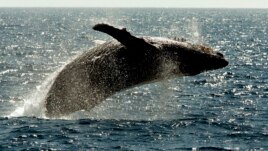01 June 2020
Scientists are urging a temporary halt to deep-sea metal mining. They warn in a report that it could cause severe, damaging effects on Pacific Ocean areas.
The recently-released report examined more than 250 published studies on deep-sea mining. The research was examined by the Deep Sea Mining Campaign – a collection of not-for-profit organizations. Environmental group MiningWatch Canada also cooperated on the study.

A humpback whale jumps out of the water off the coast of Lahaina on the island of Maui in Hawaii. (AP Photo/Reed Saxon, file)
The report centers on mining activities related to small metallic particles, called nodules, found on the seabed. The material can contain different metals, such as copper, cobalt, nickel and manganese.
Increasing demand for these metals has led to a rise in deep-sea mining operations. The metals are commonly used in battery manufacturing and other technology products.
The Deep Sea Mining Campaign says the metallic nodules have drawn intense interest by companies and investors because the Pacific Ocean covers about 30 percent of Earth's surface.
However, the scientists warn that mining for these nodules would cause "irreversible damage" to "an ocean already under pressure." The operations would affect areas across the South Pacific, including the nations of Kiribati, the Cook Islands, Nauru, Tonga and Papua New Guinea.
The report notes that "a moratorium is the only responsible way to move forward" until certain conditions surrounding deep-sea mining can be met. The scientists are calling for additional study to fully understand the environmental, social and economic risks.
Andrew Chin was the report's lead researcher. He said in a statement that nodule mining will likely result in the loss of sea life and cause damage to deep sea beds for thousands of years. He added that the operations could put people at risk who depend on the ocean and its continued health.
Helen Rosenbaum is with the Deep Sea Mining Campaign. She said the research showed damage will result from the removal of the nodules themselves, which unsettles sediment. In addition, waste will be released into the ocean from the mining process.
"At this point we don't know what's going to be in that sediment, what kind of heavy metals might be there, how bio-available they are... how readily they might be taken up in the food chain," Rosenbaum said.
The International Seabed Authority, an intergovernmental organization based in Kingston, Jamaica, has approved about 30 deep sea exploration requests, 25 of them in the Pacific Ocean.
Eighteen of the licenses cover the area known as the Clarion Clipperton Zone. This area stretches about 4.5 million square kilometers from Kiribati to Mexico.
A company planning to be one of the first to carry out mining operations in the area is Canada's DeepGreen, which aims to begin by 2024. It seeks to mine metallic nodules to be used in power systems for electric vehicles.
DeepGreen Chief Executive Officer Gerard Barron defended the company's plans in reaction to the report. He said deep-sea mining offers the best alternative to surface mining, which has a long history of pollution and destroying forests and wildlife.
"I think it was a bias, narrow view, which doesn't address any the issues, by a group of people that have their hearts set on trying to stop the progress of this industry," Barron said.
He added that the demand for deep-sea mining will keep rising as electric vehicle manufacturing increases in the future.
"The argument should be what has the lowest impact from an environmental and a societal perspective," Barron said. He noted that the Clarion Clipperton Zone contained "enough nickel and cobalt to electrify a billion electric vehicles."
I'm Bryan Lynn.
Luke Hunt reported this story for VOA News. Bryan Lynn adapted the report for Learning English, with additional information coming from the Deep Sea Mining Campaign. Hai Do was the editor.
We want to hear from you. Write to us in the Comments section, and visit 51VOA.COM.
________________________________________________________________
Words in This Story
battery – n. an object that provides electricity for things
irreversible – adj. not able to be undone or changed
moratorium – n. the stopping of an activity for a certain period of time
sediment – n. a solid substance that forms a layer at the bottom of a liquid
food chain – n. a series of living things that are linked because each groups of things eats the groups below it in the chain
alternative – n. another way of doing something
bias – n. the action of supporting or opposing a particular person or thing in an unfair way, because of permitting personal opinions to influence your judgment
impact – n. a powerful effect something has on a particular person or situation
perspective – n. a particular way of considering something